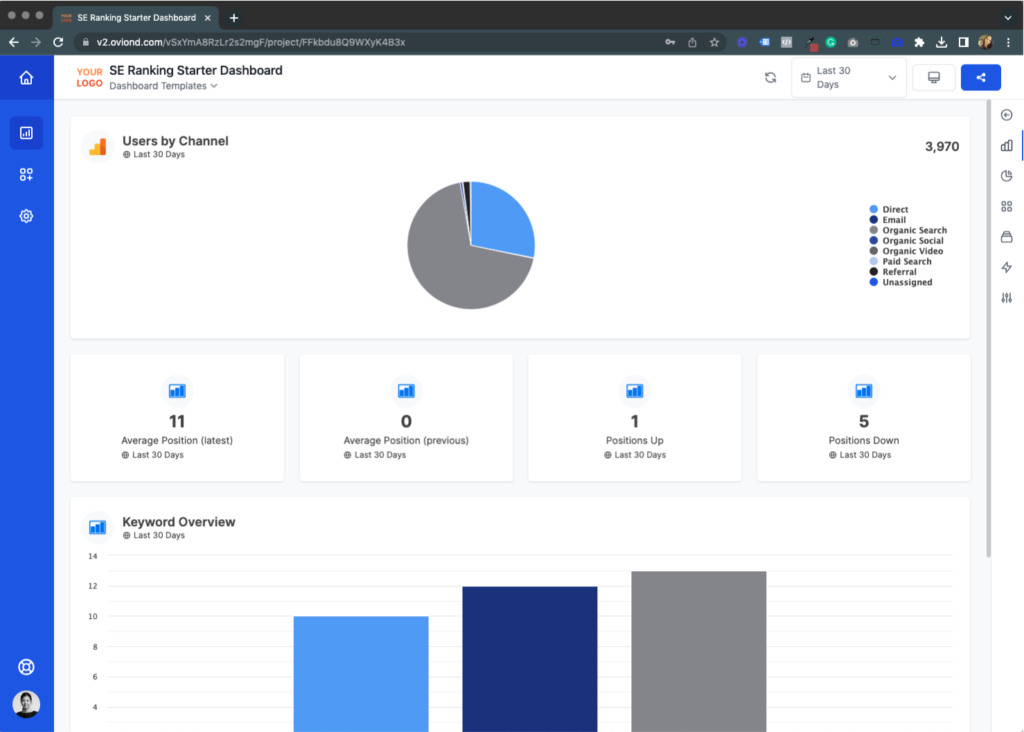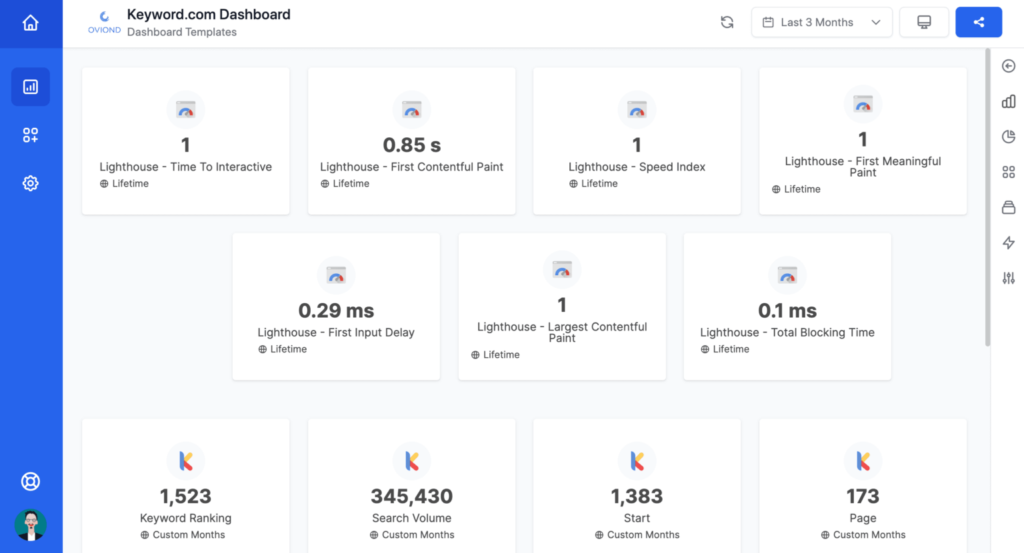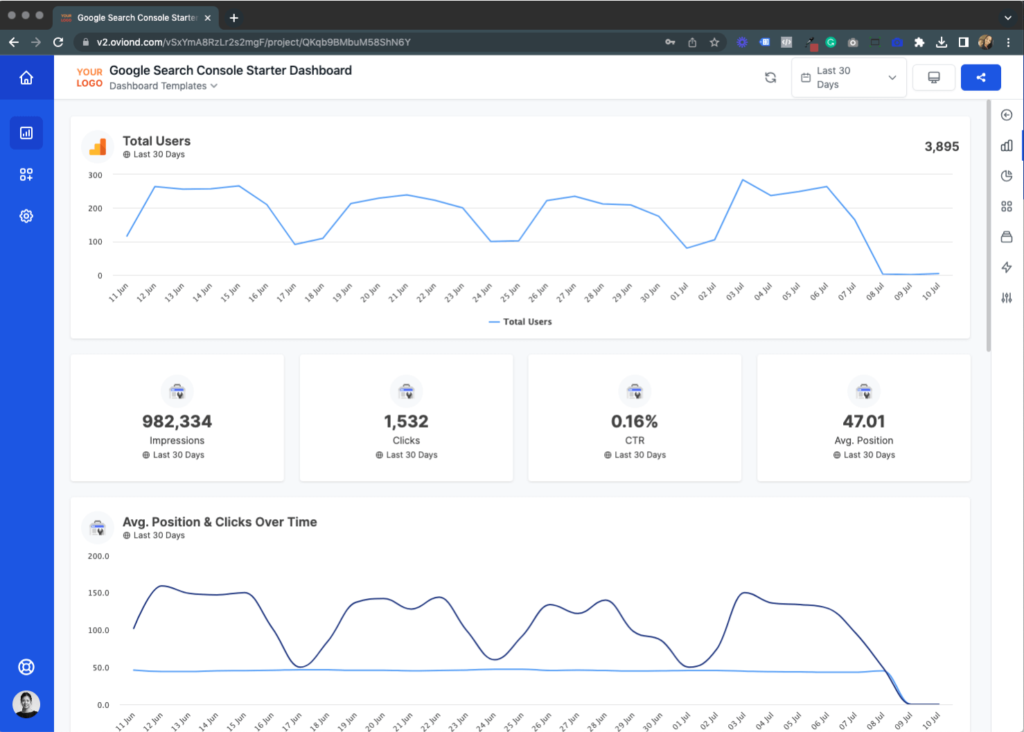Table of Contents
Crafting Your Website SEO Report
In the digital era, where the competition for online visibility is fierce, mastering the art of a comprehensive website SEO report is not just an advantage; it’s a necessity. This guide unfolds the secrets behind creating website SEO reports that not only provide a snapshot of your current standings but also pave the way for strategic improvements, ensuring your digital presence is not just seen, but also felt. From unveiling hidden optimization gems to fostering enduring client relationships, we dive deep into how these reports transform data into actionable insights, driving success in the digital marketplace. Join us on this journey to unlock the full potential of your online presence through expert SEO reporting.

Your Agency’s Edge: 7 Reasons Website SEO Reports Drive Success
Crafting and delivering masterful website SEO reports isn’t just a routine task – it’s the key to unlocking your agency’s full potential. Here’s why investing in excellent website SEO reports drives undeniable success:
1. Showcase Your Value with Crystal-Clear ROI
Demonstrating return on investment (ROI) is everything. Effective website SEO reports move beyond simply listing metrics. They connect the dots between your agency’s efforts in building backlinks, improving rankings, and boosting organic traffic, directly showing how this translates into revenue for your clients. This transparency builds unshakeable trust and fuels long-term partnerships.
2. Unveil Hidden Opportunities for Optimization
High-quality website SEO reports meticulously analyze site audits, user engagement, and key metrics, revealing untapped potential. This allows you to recommend targeted strategies – like identifying underperforming keywords for optimization – to further enhance your client’s online presence.
3. Guide Client Strategies with Data-Driven Insights
Data is your most powerful ally. Your website SEO reports illuminate the path forward. You can influence everything from budget allocation and content creation to link-building campaigns, ensuring alignment with your clients’ business goals.
4. Celebrate Progress and Long-Term Growth
Track and showcase long-term trends in your website SEO reports. This paints a picture of sustained success, highlighting not just quick wins, but the impact of your strategies over time.
5. Fuel Continuous Learning and Improvement
Website SEO reports educate both your team and your clients. Analyzing key metrics helps you pinpoint areas for improvement and fill any knowledge gaps. This dedication to learning keeps your agency at the forefront of SEO best practices.
6. Build Trust and Strengthen Client Relationships
Transparent, jargon-free website SEO reports bring clients into the process, making them feel informed and empowered. This open communication is the foundation of strong, lasting partnerships.
7. Unlock Growth and Upselling Opportunities
When clients see their SEO metrics consistently improving, they’re more likely to expand their investment with your agency – like requesting additional services based on the insights you provide within those website SEO reports.
The bottom line is: Masterful website SEO reporting is the tool that elevates your agency. It’s about data-driven storytelling, strategic insights, education, and building unbreakable client relationships. Invest in exceptional reporting and watch your agency soar.

Choosing the Right SEO Metrics and KPIs for Your Website’s SEO Report
Selecting the optimal SEO metrics and KPIs for your client reports is a crucial step that demands careful consideration. These metrics should not only align with your client’s primary goals but also provide clear, actionable insights without overwhelming them with data. Here’s an enhanced guide to picking the most effective KPIs for your SEO reports:
| Step | Guideline | Details |
|---|---|---|
| 1 | Tailor Metrics to Client Goals | Identify client’s main objectives (e.g., improving search rankings, increasing organic traffic). Tailor metrics to these goals. |
| 2 | Contextualize Data for Deeper Insights | Add context by benchmarking against industry standards, comparing with competitors, and correlating SEO activities with metric fluctuations. |
| 3 | Focus on Actionable Metrics | Select metrics that prompt specific actions and define what makes a metric actionable. |
| 4 | Limit Report to Essential KPIs | Keep reports focused by limiting to 8-10 key metrics, based on a mix of core and goal-specific metrics. |
| 5 | Incorporate Historical Data for Trend Analysis | Use historical comparisons to highlight trends. Present data in visually engaging formats. |
| 6 | Enhance With Secondary Metrics | Use 1-2 secondary metrics for additional context to complement primary KPIs. |
| 7 | Align with Client Preferences and Insights | Understand client metric preferences and balance these with professional judgment on the most meaningful insights. |
| 8 | Ensure Consistency Across Reports | Maintain consistent metric use for effective trend analysis and progress tracking. Communicate clearly when introducing new metrics or phasing out old ones. |

Additional Enhancements:
| Enhancement | Details |
|---|---|
| Use Visual Aids | Employ charts, graphs, and other visualizations to make data more intuitive and engaging. |
| Customize Reports | Adjust reports to the client’s industry, goals, and SEO knowledge level. |
| Incorporate Competitive Analysis | Include competitive benchmarking to provide insights on the client’s performance relative to key competitors. |
| Predictive Insights | Offer predictive insights or trend forecasts where possible to help clients plan their SEO strategy. |
Careful metric selection results in streamlined, goal-aligned reporting. Exclude irrelevant numbers that won’t directly guide strategy or optimization. And remember – insightful analysis trumps data dumps every time.

Best Practices for Presenting Website SEO Reports
Follow these tips to create professional, polished reports that clearly communicate insights:
📊Use Visualizations Like Charts and Graphs
Opt for a variety of visualization tools like interactive dashboards, infographics, and video summaries in addition to charts and graphs. This variety caters to different learning styles and preferences, making your reports more accessible and engaging.
🗣️Explain Metrics Contextually
Interpret what the metrics mean in plain English. Don’t assume familiarity with SEO jargon. Explain acronyms. Narrate the journey of the metrics from the previous period to the current one, highlighting key achievements, challenges, and the strategies that led to changes. This approach makes your reports more relatable and memorable.
💡Make Recommendations Based on Insights
Pair each metric with a tailored action plan. Utilize a “If this, then that” approach to recommend specific steps for improvement or further growth. For instance, if organic traffic has decreased, suggest an SEO audit or content refresh, providing clear, actionable advice.
⏱️Automate and Schedule Reports for Efficiency
While automating the generation and scheduling of reports, personalize each report’s executive summary to reflect on the period’s achievements, challenges, and focus areas for the next period. Personalization shows your clients that you are actively engaged in their success.
📆Send Reports on a Consistent Cadence
Be consistent in your reporting frequency, but also offer flexibility for ad-hoc reports in response to significant changes or upon request. This balance between consistency and adaptability ensures clients feel supported and informed at all times.
🔍Incorporate Data Segmentation for Precision
Go beyond basic segmentation by incorporating advanced data analysis techniques such as cohort analysis or user flow paths. These insights can unveil deeper trends and behaviors that inform more nuanced strategies.
✅Highlight Key Takeaways and Executive Summary
Start your report with an executive summary that highlights the most critical insights, achievements, and recommendations. Use bullet points or a brief paragraph to ensure this section is quick to read and easy to understand.
🎨Consistent, Clear, and Branded Formatting
Adopt a branded template for your reports that reflects your agency’s identity. Ensure that this template uses clear, non-distracting fonts and colors, and maintains a logical flow of information. Consistency in formatting not only reinforces your brand but also improves readability.
💬Focus on Insightful Communication
Strive for clarity in every aspect of your report. Avoid technical jargon, use simple language, and ensure that your insights are directly applicable to your clients’ goals and challenges. Encourage feedback and questions to foster a dialogue that can lead to more personalized and effective future reporting.
By adopting these enhanced practices, your SEO reports will not only deliver data but also drive decision-making, foster stronger client relationships, and demonstrate the tangible value your agency brings to each project.

Common Pitfalls in SEO Reporting and How to Avoid Them
Steer clear of these common SEO reporting pitfalls:
| Mistake to Avoid | How to Avoid Making it |
|---|---|
| Contextless Data Presentation | Enrich reports with narratives that explain the data in the context of the client’s business goals. Highlight trends, changes, and specific optimization opportunities. |
| Using Jargon Without Explanations | Use clear, accessible language and define technical terms to ensure reports are understandable to all stakeholders. |
| Failing to Make Data Actionable | Transform data into actionable intelligence by coupling metrics with practical advice on leveraging positive trends or mitigating negative ones. |
| Not Aligning Reporting to Business Goals | Focus on metrics that advance the client’s business objectives, such as rankings, traffic, conversions, and exclude extraneous data. |
| Inconsistent Formatting and Analysis | Opt for clean, consistent formatting; straightforward, engaging visualizations; ensure data is current, and perform trend analysis over relevant timeframes. |
In conclusion, adopting best practices in SEO reporting significantly enhances client experiences by providing them with insights that are not only actionable and aligned with their business objectives but also presented in an accessible and analytically rigorous manner, ultimately driving their online success.

Types of SEO Reports to Create for Clients
Creating tailored SEO reports for clients means aligning each report with their specific needs and strategic goals. Here’s how specialized reports can drive insights and action:
SEO Overview Report
Offers a comprehensive snapshot of the website’s overall SEO performance, combining insights on rankings, traffic, backlinks, and site health. This report is essential for giving clients a broad understanding of their SEO landscape and setting the stage for targeted strategies.
Site Audit Report
Delves into the technical foundation of the website, assessing aspects such as crawlability, on-page errors, HTTPS security, and site speed. It’s crucial for identifying technical barriers to performance and laying out a roadmap for technical optimizations.
Organic Traffic and Engagement Report
Breaks down organic traffic sources, engagement metrics, and user behavior on the site. This report highlights the effectiveness of SEO strategies in attracting and retaining visitors, providing clear direction on where to focus content and user experience improvements.
Organic Conversions Report
Focuses on the conversion aspect of SEO, analyzing how organic traffic contributes to business goals. By examining conversion rates, visitor behaviors, and the performance of landing pages, this report identifies potent opportunities for increasing conversions through targeted optimizations.

Site Ranking and Keyword Report
Tracks the performance of targeted keywords over time, offering insights into visibility on search engines. This is vital for understanding competitive positioning and for refining keyword strategies to capture more organic search market share.
Backlink Analysis Report
Provides a detailed look at the site’s backlink profile, including new links gained, the quality of referring domains, and the overall impact on domain authority. This report is key to understanding and enhancing the site’s credibility and authority through link-building efforts.
Content Performance Report
Evaluates the success of content in terms of traffic, engagement, and its contribution to SEO goals. Insights from this report guide content strategy, helping to focus efforts on high-performing topics and formats.
Website Speed Report
Focuses on the critical aspect of site speed, linking performance to user experience and SEO rankings. This report advocates for speed optimization projects by demonstrating their impact on user satisfaction and search performance.
Local SEO Report
Tailored for businesses targeting local markets, this report assesses local search performance, including local rankings, GMB listing effectiveness, and local user engagement. It’s instrumental for businesses aiming to dominate local search results and attract nearby customers.
By enhancing these report types with a focus on strategic insights, actionable recommendations, and clear communication of benefits, agencies can provide immense value to their clients, helping them to navigate the complexities of SEO and achieve their digital marketing goals.

Website SEO Reports: Transform Data into Client Wins
Digital marketing agencies that excel in SEO reporting gain a powerful strategic advantage. These reports aren’t merely proof of your work; they strengthen client relationships, reveal opportunities, guide strategic decisions, and can position you as an indispensable advisor.
Here’s how to shift from simple reporting to impactful insights:
- Metrics that matter: Align KPIs directly with each client’s goals. Conversions matter more than traffic if the goal is sales.
- Visualization: Graphs and charts clarify trends faster than dense data tables.
- Layman’s explanations: Don’t just present numbers; tell the story of why they changed and what that means for the client.
- Actionable steps: Recommendations based on the data are what clients truly value.
- Templates tailored to needs: Every client is different; some need deep technical dives, others want high-level summaries.
- Regular cadence: Consistent reporting builds trust and allows you to track progress against goals.
Elevating your SEO reporting makes you an indispensable partner. This builds client loyalty, opens the door for upselling, and fuels your agency’s growth.
Tools like Oviond’s reporting software streamline the process, allowing you to focus on analysis, not data entry. Discover how Oviond can transform your reporting – start your 15-day free trial today!

Everything You Want to Know About Website SEO Reporting (FAQs)
What are some key ranking metrics to include in a websites SEO report?
Key ranking metrics to include are current keyword positions, search impressions, clicks, and visibility for target keywords. Compare against past rankings to show optimization progress over time. Segment by device and location for deeper analysis.
Should I include mobile vs desktop data in a website SEO report?
Include data segmented by mobile vs desktop in your website SEO reports to provide a comprehensive view of performance. Mobile usage continues to grow, so tracking its impact on rankings and engagement is crucial.
How often should websites SEO reports be created and delivered to clients?
Most agencies create and deliver website SEO reports on a monthly or quarterly basis. Monthly allows close tracking while quarterly works well for showcasing big picture progress. Ensure consistent cadence for trend analysis.
What’s the best way to present website SEO reporting data visually?
Effective visualizations for websites SEO reports include charts, graphs, gauges, and heatmaps. Avoid dense tables of numbers. Use visuals like bar charts to simplify data analysis for clients. Maintain branding with color schemes.
Should I automate website SEO report generation or create manually?
Automating websites SEO report generation through marketing dashboards saves time over manual creation. But customize and add insights relevant to each client vs generic reporting.
How long should a website SEO report be?
Websites SEO reports should be 2-5 pages long. Include key metrics and insights without overwhelming readers. Summarize key takeaways upfront. Provide analysis and strategic recommendations.
What SEO tools do I need to create in-depth website SEO reports?
Useful SEO tools for creating in-depth website reports include SEMrush, Ahrefs, and Google Analytics. Pull rankings, backlinks, traffic, and engagement data. Consider Google Search Console for crawl stats.
How do I make website SEO data easy for clients to understand?
To make website SEO data easy to understand, explain acronyms, technical jargon, and metrics contextually. Use simple language. Include visualizations like charts. Highlight key takeaways upfront.
What context should I provide along with website SEO metrics?
Provide context such as optimization opportunities, trends over time, and strategic recommendations alongside website SEO metrics. This analysis brings data to life.
Should I include competitor website SEO benchmarking data?
es, include competitor website benchmarking in SEO reports to showcase your progress relative to key players in the space. But focus report on your objectives.
